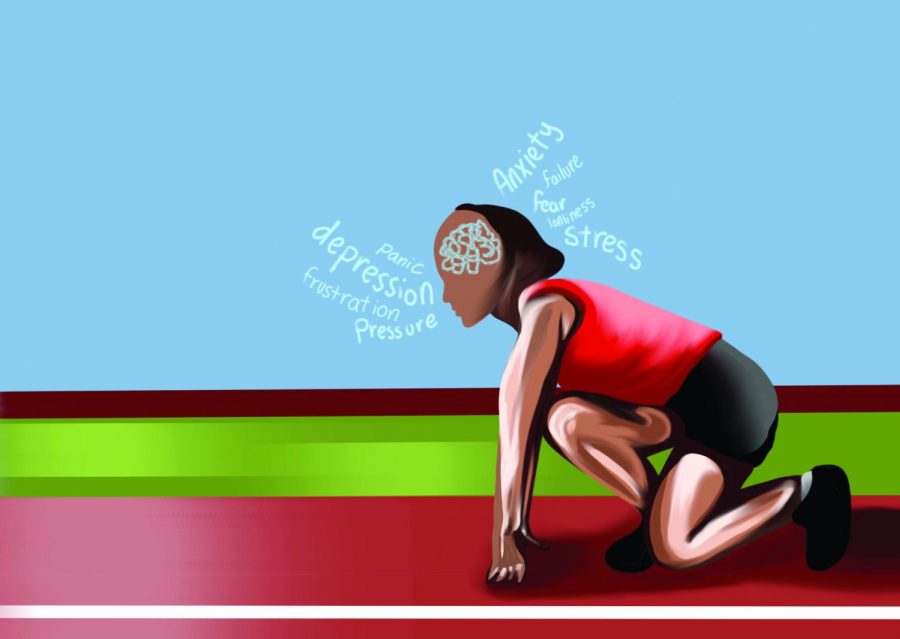Succeeding through sports psychology
August 26, 2021
As youth sports grow more competitive, student-athletes are learning more about sports psychology to gain a competitive edge over their opponents. Recently, the school decided to delve into the field, hiring Sports Psychology Program Head Kat Scardino in 2018.
“Sport psychology focuses on training the student-athlete’s mind like training any other muscle in the human body,” the school said on its website. “An athlete’s psychological state has a direct effect on sport performance, making it an essential training component. The ultimate goal is to support our student-athletes in gaining a mental edge over competitors and develop unshakeable confidence.”
Star U.S. gymnast Simone Biles highlighted the importance of sports psychology when she opened up about her struggles with mental health at the 2020 Tokyo Olympics.
Biles won gold at the 2016 Rio Olympics and became the first woman to perform a Yurchenko double pike at the U.S. Classic in May. At the 2020 Tokyo Olympics however, Biles revealed via Instagram that she suffered from a mental block known as the ‘twisties’ or ‘yips,’ which she said had affected her performance and forced her to withdraw from the games.
A term originally popularized by golfer Tommy Armour in the early 1900s, the yips have plagued athletes for decades. In a sport such as golf, the yips can include trembling wrists or muscles locking into place. In a sport like baseball, the yips could cause repeated errors on a routine ground ball.
While many high school athletes are not looking to defend a historic Olympic performance while competing, pressure can exist in any athletic environment. Several teams at school now work frequently with Scardino to improve everything from game performance to in-practice concentration.
Wrestler Jack Welsh ’24 said the wrestling team met with Scardino after several teammates arrived late to practice, which resulted in tension with the coaches and the team running sprints.
“Coach Scardino taught us that every day is a new opportunity to learn and grow as an athlete and a person,” Welsh said. “She has taught us that you can build on yesterday’s success or put its failures behind and start over again. That’s the way life is, with a new match every day, and that’s the way wrestling is.”
Prior to working at the school, Scardino served as Director of Mindset Development at the Mamba Sports Academy and adjunct professor of sports and health psychology at California Lutheran University. While initially hired by the school to work with the girls basketball program, Scardino soon expanded to other teams at the school.
Scardino explained the responsibilities and expertises sports psychologists posess and how they contribute to the success of athletes.
“A sport psychologist or certified mental performance coach (CMPC) is a trained professional who works directly with athletes on the mental aspect of performance as well as managing an athletes overall emotional and mental well being,” said Scardino. “Essentially, we work to help athletes train their minds just as they would their body. This can look different in action depending on the specific athlete or team.
Scardino said she now works with both coaches and athletes to help teach them how to grow as athletes, which can look different depending on each athlete’s individual needs.
“Some athletes I work with benefit most from mental skills training which is the development of tools to manage things like performance anxiety, confidence, improving focus and getting into the zone more consistently,” Scardino said. “Other athletes benefit most from working on aspects of their broader mental health, including managing depression, anxiety [and attention deficit hyperactivity disorder]. An athlete’s mental health directly affects their performance and vice versa, so we work to provide each athlete with individual skills that help them to be the strongest version of themselves in and out of their sport.”
Wrestling Coach Junior Amazan said the utilization of the resources the school’s sports psychology program provides has significantly impacted both the wrestling team’s mental health and their performance in competitions in a positive manner.
“Sports psychology is extremely important to what we do as a wrestling team,” Amazan said. “In fact, we refer to our sport [psychology] training as ‘Wolverine Mentality.’ It gives all of our wrestlers the tools that they need to focus on the task at hand and not get distracted by a lot of the obstacles that our young men and women [athletes] will always face. It also gives us a way to check in and monitor the mental health of our wrestlers during the chaotic stretches of the season. Without Coach Scardino, we would not be able to make the significant strides that we have recently made as a wrestling program.”































